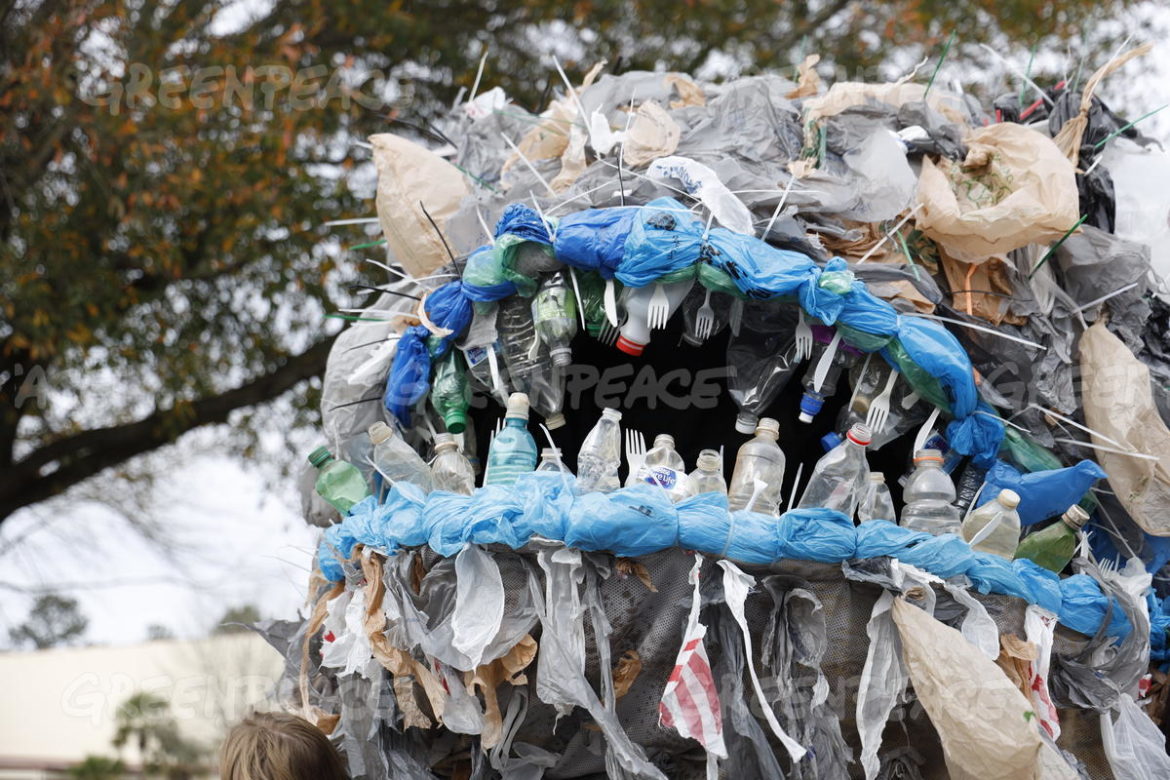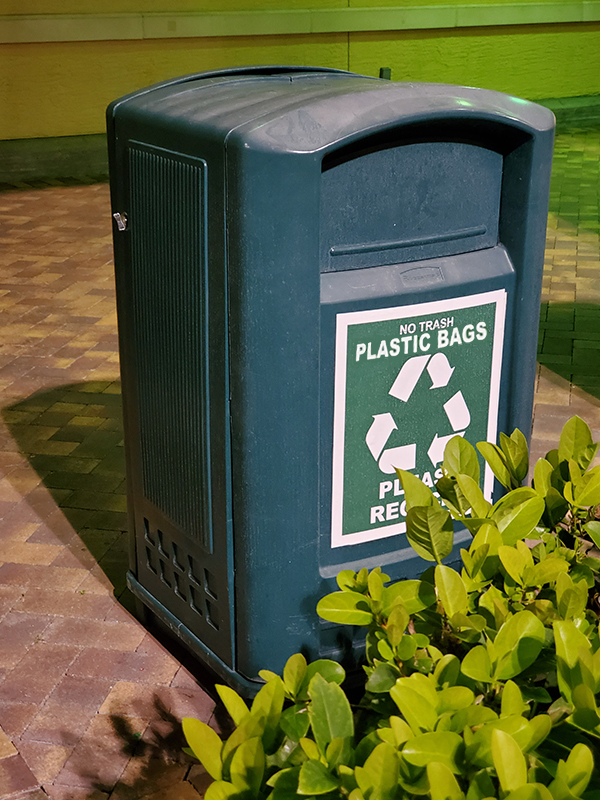TALLAHASSEE, Fla. – The organization, Greenpeace, is on the road across Florida showing up with a 15-foot (4.57m) grey “trash goblin” in Publix Super Markets parking lots. They want to shame the grocery store giant into stopping its use of plastic bags.
Plastic bags are one type of use of single-use plastics that represent a serious environmental concern and many, if not most, Pagans resonate with advocacy against the continued pollution of the Earth. The Covenant of the Goddess, for example, has adopted a formal position on environmental issues and supporting “local, regional, national, and global efforts to conserve natural resources, to seek clean, sustainable sources of energy, and to rebalance our world.”
The current battle in Florida highlights the challenges of creating a sustainable balance.
Founded in 1971, Greenpeace is a non-governmental agency that uses direct-action, lobbying and research to “ensure the ability of the Earth to nurture life in all its diversity.” It is also well-known to its ecotage strategies. Ecotage is a portmanteau meaning sabotage for ecological reasons.
Publix Super Market is one of the largest US regional grocery stores operating predominantly in Florida, but with a significant presence from Alabama to Virginia. It is the largest employee-owned public company in the United States. It is also consistently listed as among the most admired companies.

Courtesy: Greenpeace
Greenpeace activists joined other groups of individuals at the State Capitol in Tallahassee this week to urge state legislators to abandon efforts in enacting preemption laws that prevent action on single-use plastics. If passed, these laws would prevent localities from enacting bans.
Greenpeace accuses Publix of having a significant role in passing the proposed preemptive laws. Greenpeace states in a press release that “Publix has not only failed to eliminate single-use plastics from its stores, but it has also worked through its front group the Florida Retail Federation to support laws that prevent Florida communities from enacting plastic bans.”
The Florida Retail Federation is an industry group composed of retailers in the state of Florida that include not only Publix but also CVS, Target, Walgreens, and Walmart.
As reported in the Miami Herald, several municipalities passed plastic bans in one form or another in the summer of 2019 only to walk back those bans a few weeks later to avoid legal battles with the Florida Retail Federation.
Greenpeace is also trying to raise awareness about the threats that single-use plastics pose to our environment. To do so, it is specifically urging the legislature to abandon its efforts to pass preemptive laws.
To ensure their concerns were heard, the activists brought the giant plastic monster with them to the capitol building to call attention to the plastic pollution problem and corporate and legislative unwillingness to address it. Greenpeace has used rubbish monsters before most notably in protests against Nestle.
Plastics, indeed, pose a serious threat to our environment. Plastic bags, in particular, have been implicated in the deaths of sea life including cetaceans, seabirds, and sea turtles.
The International Union for Conservation of Nature, a membership Union composed of both government and civil society organizations notes:
over 300 million tons of plastic are produced every year… and at least 8 million tons of plastic end up in our oceans every year and make up 80% of all marine debris from surface waters to deep-sea sediments.
The plastics affect everything from marine life to human health to coastal tourism.
Australia’s Ocean Crusaders, a waterways organization, estimates that shoppers worldwide use about 500 billion single-use plastic bags per year or about a million bags used every minute.

[Courtesy: Greenpeace]
All these issues affect Floridians intimately. Water is ubiquitous in Florida. The State has the second-longest coastline in the United States and with approximately 1,350 miles (2,170 km); and even then, the estimate does not include the barrier islands forming the archipelago on its Western and Southern coasts. It also has significant freshwater resources including its major springs, Lake Okeechobee, and the Everglades.
Greenpeace suggests that Publix is deaf to community concerns about plastics. “Publix continues to demonstrate that it cares more about maintaining its ability to use cheap plastics than answering its customers’ calls for action on the pollution crisis,” said Greenpeace Plastics Campaigner David Pinsky in a press release. “It is not acceptable for any retailer to push undemocratic laws that prevent local communities from acting on plastics. Publix needs to get out of the way and get on the right side of history by ending its reliance on single-use plastics,” he added.
In an opinion piece last for the Gainesville Sun last Fall, Pinsky and Nicole Sands, the deputy digital director at Greenpeace USA, wrote, “It is especially egregious to see Publix working to undermine local action on plastic pollution at a time when the public, including its customers, is growing more and more concerned with the issue.”
In addition to demonstrations at the state capital, Greenpeace is deploying its “plastic monster” elsewhere throughout Florida. The 15-foot trash goblin has already made appearances in Publix parking lots in Florida with stops currently planned n Gainesville, Orlando, and Tallahassee.

A Publix Recycling bin outside one of its stores. [Photo Credit: M. Tejeda-Moreno]
For its part, Publix says it is engaged in plastics reduction. It instituted a program in 2018 for recycling its plastic bags by offering bins for customers to return them. The company said in a blog post: “Part of our mission statement is to be intolerant of waste, and to be involved as responsible citizens in our communities.”
Publix added that “recyclables (plastic bags, paper bags, foam trays and egg cartons) that customers bring back to our stores are loaded on our trucks and sent to our return centers.” The company also has a specific team focused on sustainability.
Greenpeace is also taking its request directly to the public. It is asking individuals to contact Publix and support the elimination of single-use plastics. The organization is also running an online campaign to contact Publix CEO Tom Jones and demanding that Publix shift toward “reuse and refill systems to ensure that plastics from your company’s products are never again found in our oceans, waterways, or coasts.”
Pinksy and Sanders wrote last Fall, “It is time for Publix to put Florida communities, the protection of marine animals and the environment before its profits.”
Pinsky added in the current Greenpeace press release, “Publix needs to get out of the way and get on the right side of history by ending its reliance on single-use plastic.”
The Wild Hunt is not responsible for links to external content.
To join a conversation on this post:
Visit our The Wild Hunt subreddit! Point your favorite browser to https://www.reddit.com/r/The_Wild_Hunt_News/, then click “JOIN”. Make sure to click the bell, too, to be notified of new articles posted to our subreddit.